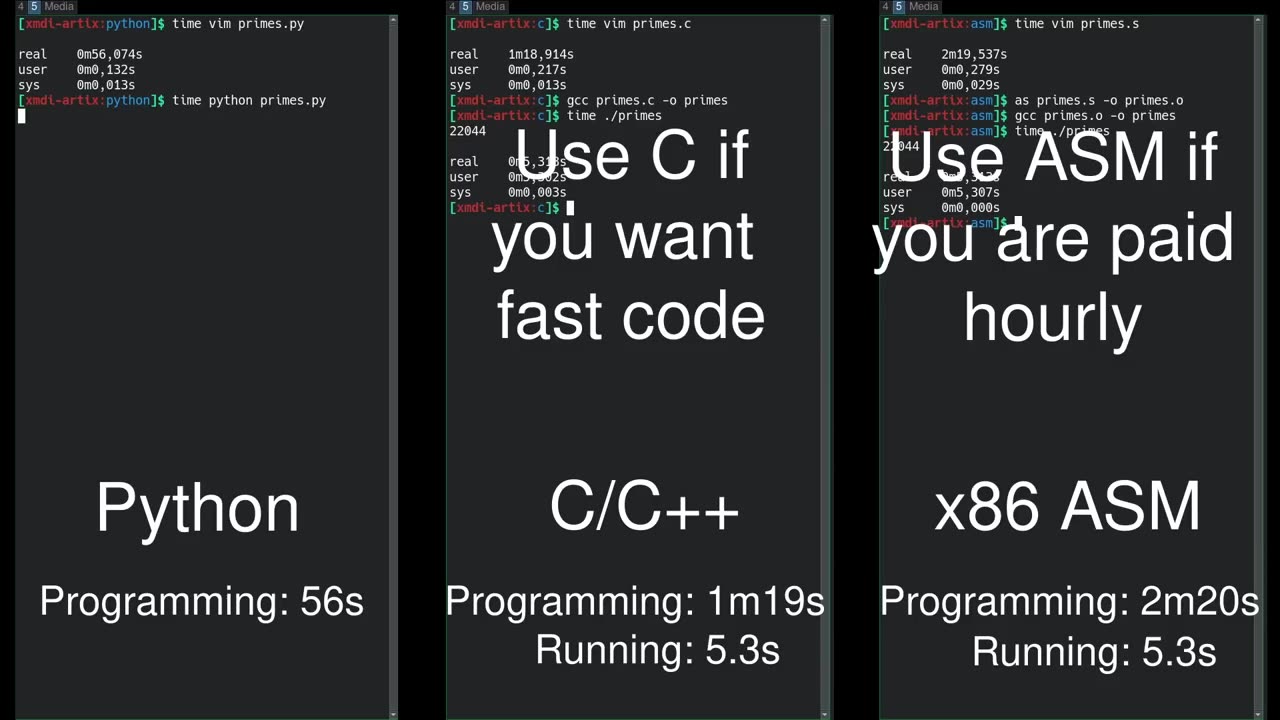Premium Only Content

Python vs C/C++ vs Assembly side-by-side comparison
Python: Python is a high-level, interpreted language that uses a clear and concise syntax, making it easy to read and write.
C/C++: C/C++ are low-level, compiled languages that use complex syntax with more punctuation and braces, making them more difficult to read and write than Python.
Assembly: Assembly is a low-level, hardware-specific language that uses mnemonics and binary instructions, making it difficult to read and write for most programmers.
Performance:
Python: Python is slower than C/C++ and Assembly because it is an interpreted language that requires an interpreter to run.
C/C++: C/C++ are faster than Python and Assembly because they are compiled languages that produce machine code that can be executed directly by the CPU.
Assembly: Assembly is the fastest language because it allows programmers to write code that directly interacts with the hardware, bypassing any overhead associated with higher-level languages.
Portability:
Python: Python is highly portable and can run on almost any platform, including Windows, macOS, Linux, and mobile devices.
C/C++: C/C++ are portable, but require compilation for each platform, making them less convenient to use than Python.
Assembly: Assembly is highly dependent on the hardware and platform it is written for, making it less portable than Python and C/C++.
Application:
Python: Python is used in a wide range of applications, including web development, scientific computing, data analysis, artificial intelligence, and machine learning.
C/C++: C/C++ are used in systems programming, game development, embedded systems, and high-performance computing.
Assembly: Assembly is used in low-level programming, device driver development, and operating system development.
python,c/c++,c programming,c++ programming,assembly,asm,x86,x86_64,programming,coding,performance,comparison,speed,time
-
 LIVE
LIVE
The Jimmy Dore Show
1 hour agoGaza Ceasefire Is ON — But Will It Hold? Trump CONSIDERING Ghislaine Maxwell Pardon! w/ Ian Carroll
4,557 watching -
 LIVE
LIVE
Stephen Gardner
17 minutes ago🔥Trump's 2 HUGE wins the media REFUSES to report!
555 watching -
 LIVE
LIVE
Dr Disrespect
8 hours ago🔴LIVE - DR DISRESPECT - BATTLEFIELD 6 - THE WAR BEGINS | BF6 LAUNCH DAY
2,083 watching -
 LIVE
LIVE
Nerdrotic
2 hours agoTron: Ovaries! | Peacemaker GUNNS Down DCU | Hollywood Death Spiral | Friday Night Tights 375
1,470 watching -
 LIVE
LIVE
LFA TV
17 hours agoLIVE & BREAKING NEWS! | FRIDAY 10/10/25
1,320 watching -
 1:09:03
1:09:03
vivafrei
4 hours agoCriminals Are Getting Nervous! Democrats Can't Give Trump Credit! AND MORE!
72.4K23 -
 12:56
12:56
Dr. Nick Zyrowski
8 days agoFasting Is THE Cure: No Food For 2 Days Is The Perfect Fast! (Here’s Why)
6.3K4 -
![MAHA News [10.10]: Cannabis Reform, Kennedy Exposes "Vaccines Saved Lives", An Inconvenient Study](https://1a-1791.com/video/fwe2/09/s8/1/-/k/v/p/-kvpz.0kob-small-MAHA-News-10.10.jpg) LIVE
LIVE
Badlands Media
17 hours agoMAHA News [10.10]: Cannabis Reform, Kennedy Exposes "Vaccines Saved Lives", An Inconvenient Study
551 watching -
 1:51:23
1:51:23
The Quartering
4 hours agoTrump Snub Backfires, Matt Walsh Sounds The Alarm, Candace Owens Theory On Charlie Kirk
104K42 -
 LIVE
LIVE
Owen Shroyer
1 hour agoOwen Report - 10-10-2025 - Qatari Airbase In America Angers Israeli Lobby
1,268 watching